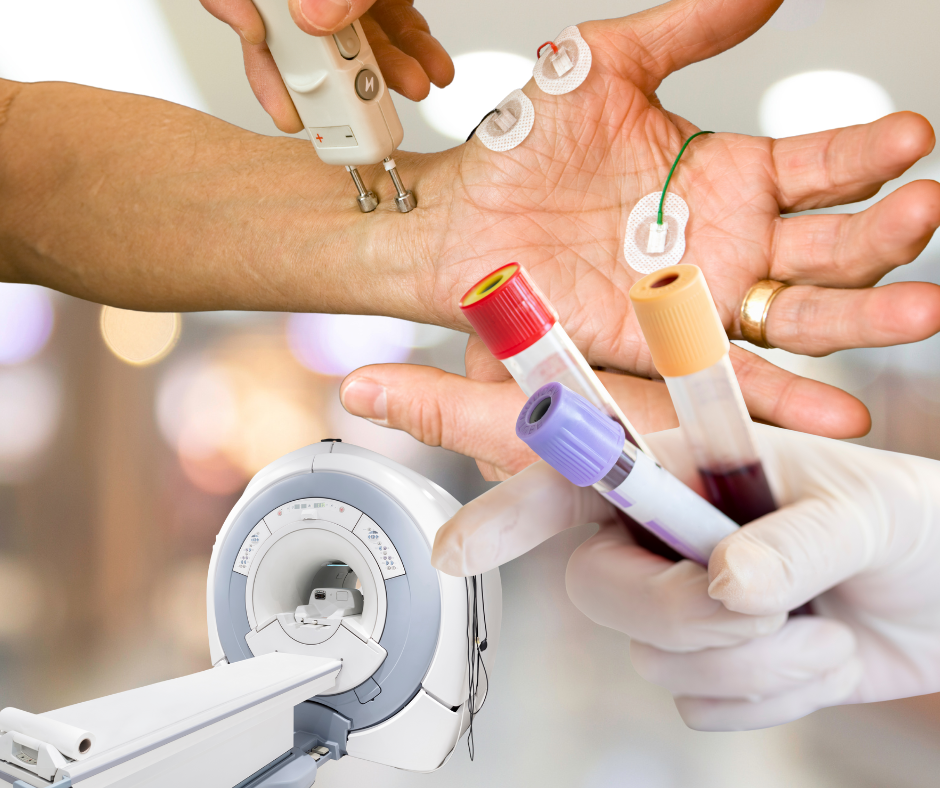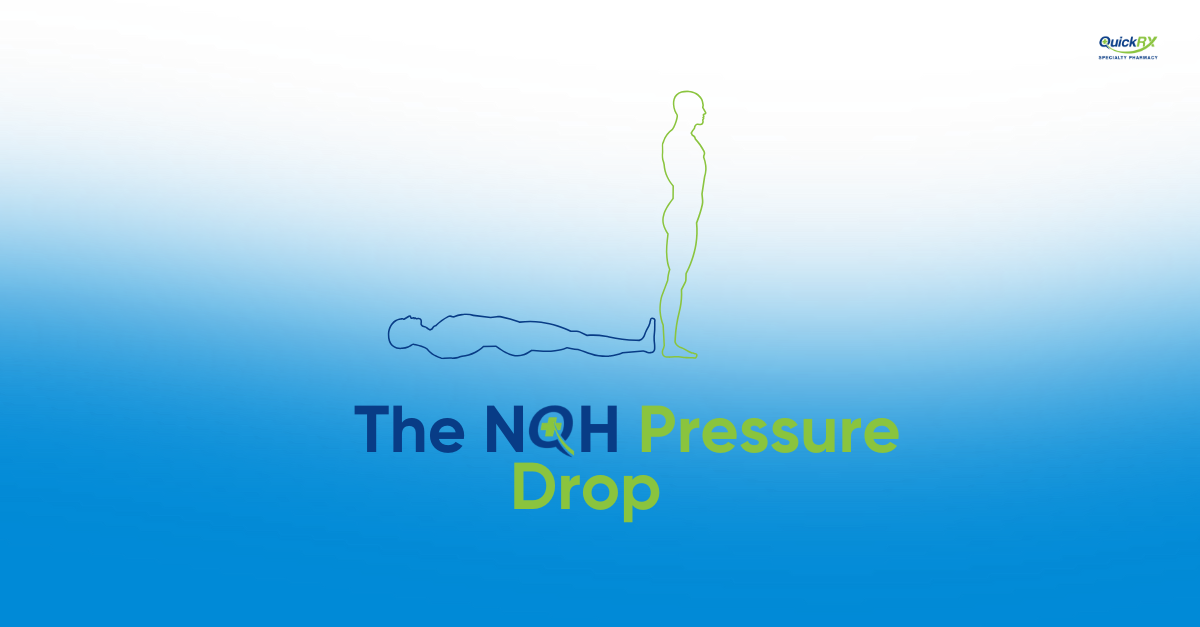Beyond Parkinson’s: Understanding NOH Across Multiple Conditions
If you’ve ever felt dizzy after standing up quickly, you’ve experienced a brief version of what people with neurogenic orthostatic hypotension (NOH) battle daily. That momentary wooziness becomes a constant companion for these patients – threatening their independence and sometimes even their safety.
While doctors often discuss NOH in relation to Parkinson’s disease, many patients with different neurological conditions face this same challenging symptom. Let’s look beyond Parkinson’s to understand how NOH affects people with various conditions, and what can be done about it.
What is NOH, Really?
In simple terms, NOH happens when your blood pressure drops dramatically upon standing. Unlike the occasional lightheadedness anyone might experience, NOH is caused by a malfunction in the autonomic nervous system – the part of your nervous system that should automatically adjust your blood pressure when you change positions.
How It Feels
Most people with NOH describe some combination of:
- Dizziness or lightheadedness when standing up
- Blurry vision or “seeing stars”
- Feeling weak or fatigued
- Pain in the neck and shoulders (often called “coat-hanger” pain)
- Fainting or near-fainting
- Brain fog or trouble thinking clearly
For many, these symptoms make everyday tasks like showering, cooking, or even walking to the mailbox incredibly challenging. Falls are common and can lead to serious injuries.
Beyond Parkinson’s: Who Else Gets NOH?
While Parkinson’s disease gets most of the attention when it comes to NOH, several other conditions frequently involve this troublesome symptom.
Multiple System Atrophy (MSA)
MSA is a rare but serious condition that affects multiple body systems. If you have MSA, you’re very likely to experience NOH – studies suggest up to 80% of MSA patients deal with this symptom, often early in their disease course.
Pure Autonomic Failure (PAF)
PAF directly attacks the autonomic nervous system, which controls blood pressure regulation. Almost everyone with PAF experiences NOH, and it’s often their main complaint.
Unlike some other conditions on this list, PAF generally doesn’t affect movement or cognition – but the blood pressure problems can be severe enough to be debilitating on their own.
Diabetic Autonomic Neuropathy
If you’ve had diabetes for many years, you might develop autonomic neuropathy – nerve damage that affects your autonomic functions. About a third of patients with diabetic neuropathy experience NOH.
What makes this particularly tricky is that diabetes brings its own set of complications. Managing both blood sugar and blood pressure becomes a complex balancing act.
Autoimmune Autonomic Ganglionopathy (AAG)
This tongue-twister of a condition occurs when your immune system attacks specific parts of your autonomic nervous system. It’s rare, but for those affected, NOH is usually front and center among their symptoms.
Unlike some other causes of NOH, AAG sometimes responds to treatments that target the immune system, giving patients additional options.
How Doctors Diagnose NOH Across These Conditions

NOH Diagnostic Testing Methods
If you suspect you might have NOH, your doctor will likely start with some straightforward tests.
Basic Testing
The simplest test involves measuring your blood pressure while you’re lying down, and then again after you stand up. A drop of 20 points or more in your systolic pressure (the top number) or 10 points in your diastolic (bottom number) within three minutes suggests orthostatic hypotension.
For a more controlled version of this test, your doctor might recommend a tilt-table test. You’ll lie flat on a special table that can be tilted upward while your blood pressure is carefully monitored.
Tests May Vary By Condition
Depending on what condition your doctor suspects, they might recommend additional tests:
- For possible MSA: They’ll look closely at movement symptoms and might order specific brain MRIs
- For suspected diabetic neuropathy: You’ll likely undergo a comprehensive nerve function assessment
- For possible AAG: Blood tests can look for specific antibodies
Get Copay Assistance
Treating NOH: Focus on Droxidopa (Northera)
Managing NOH often requires a combination of approaches, but medication frequently plays a central role. One medication that specifically targets NOH is droxidopa, sold under the brand name Northera.
How Droxidopa Works
Droxidopa is converted to norepinephrine in your body, which helps raise your blood pressure and improve symptoms. The FDA has approved it specifically for NOH associated with several neurological conditions.
Research led by Dr. Italo Biaggioni and colleagues at Vanderbilt University has shown that droxidopa can significantly reduce dizziness and other NOH symptoms in patients who respond to the medication. Their clinical trials demonstrated that when patients who initially responded to droxidopa were switched to placebo, their symptoms worsened, confirming the medication’s effectiveness for many patients with NOH.
Different Responses in Different Conditions
Not everyone responds the same way to droxidopa. How well it works may depend partly on your underlying condition:
- If you have Parkinson’s, studies show you’ll likely see improvement with relatively few side effects
- With MSA, you might benefit, but your doctor will need to watch carefully for high blood pressure when you’re lying down
- If you have PAF, you might respond particularly well because your issues are primarily in the peripheral nervous system
- With diabetic autonomic neuropathy, there’s less research, but some patients do improve
Julia Kravtsova, PharmD at QuickRx Specialty Pharmacy, has observed this variability firsthand: “We’ve seen that patients with different underlying conditions may respond differently to droxidopa. Working closely with neurologists to adjust dosing based on the specific condition often leads to better outcomes.”
The Cost Factor: Can You Afford Northera?

Understanding the financial aspects of NOH treatment is crucial for long-term management
Let’s be honest…Northera is expensive. Without assistance, it can cost several thousand dollars monthly. This price tag puts it out of reach for most patients without some form of help managing the costs.
Insurance Coverage
Your insurance coverage will significantly impact what you’ll pay out-of-pocket:
- Commercial insurance typically covers Northera, but you may still face substantial copays
- Medicare Part D usually places it in the specialty tier with significant cost-sharing
- Medicaid coverage varies dramatically from state to state
These coverage limitations often leave patients with high out-of-pocket expenses, creating barriers to accessing this medication despite having insurance.
QuickRx: Your Partner in Accessing Northera
At QuickRx Specialty Pharmacy, we’ve built our business around helping patients overcome these financial barriers. Unlike other pharmacies that might simply refer you elsewhere for assistance, we take a hands-on approach to solving your medication access challenges.
How We’re Different
Our specialized team works directly with you to:
- Conduct thorough benefit investigations to understand your specific insurance coverage
- Navigate the complexities of prior authorizations – often the first hurdle in getting approved
- Identify and secure copay assistance for which you may qualify
- Provide ongoing support to ensure you never experience gaps in treatment
For commercially insured patients, we can often reduce your out-of-pocket costs to a fraction of what you’d pay elsewhere. Many of our patients pay minimal amounts for medications that would otherwise cost thousands.
No Referrals, Just Results
Rather than sending you to navigate complex assistance programs on your own, we handle the entire process in-house. Our team has extensive experience with Northera specifically and understands the unique challenges associated with this medication.
Julia Kravtsova, PharmD at QuickRx, explains our approach: “We don’t just fill prescriptions. We become advocates for our patients, working directly with insurance companies, physicians, and assistance programs to minimize costs and eliminate barriers to medication access.”
Contact our dedicated team today to learn how we can help you access Northera at the lowest possible cost. One phone call could make the difference between affordable treatment and prohibitive expenses.
Daily Life With NOH: Practical Tips

Practical approaches to managing NOH symptoms in everyday activities
Beyond medication, several practical strategies can help you manage NOH day to day. What works best might depend somewhat on your underlying condition.
Need Northera Copay Assistance?
Strategies For Everyone
No matter what’s causing your NOH, these tips can help:
- Get up gradually: Move from lying to sitting, wait a moment, then stand
- Stay hydrated: Aim for 2-3 quarts of fluid daily unless your doctor advises otherwise
- Add salt (if your doctor approves): Increasing salt intake can help maintain blood pressure
- Eat smaller meals: Large meals can worsen blood pressure drops
- Consider compression garments: These help keep blood from pooling in your legs
Dr. Christopher Gibbons of Harvard Medical School emphasizes: “Patient education about the nature of the condition, symptom recognition, and preventive strategies is fundamental to the successful management of neurogenic orthostatic hypotension.”
Condition-Specific Tips
Some strategies are particularly helpful for specific conditions:
- If you have Parkinson’s: Time your NOH medications around your Parkinson’s drugs
- For MSA patients: You might need more aggressive management given the typically severe NOH
- With diabetes: Coordinate blood pressure and blood sugar management carefully
- If you have PAF: Physical countermeasures like crossing your legs or squeezing your thighs when standing may be especially helpful
What’s on the Horizon?
Research continues to advance our understanding of NOH across different conditions. Scientists are working on:
- Finding specific biomarkers that might help with earlier diagnosis
- Developing treatments targeted to specific underlying conditions
- Testing combinations of medications and non-drug approaches
Dr. Jose-Alberto Palma and his colleagues at NYU Langone Health have been at the forefront of this research. In their comprehensive review published in CNS Drugs, they examine how the underlying pathophysiology of NOH differs between conditions like Parkinson’s disease, MSA, and PAF. Their work suggests that treatment approaches may need to be tailored to the specific condition causing NOH, rather than using a one-size-fits-all approach. As our understanding of these differences grows, we may see more personalized and effective management strategies emerge.
Finding Your Way Forward
Living with NOH is challenging, but understanding how it relates to your specific condition is an important step toward better management.
If you’re dealing with NOH:
- Work with healthcare providers familiar with autonomic disorders
- Consider consulting with specialists who understand your specific underlying condition
- Explore all available medication options, including droxidopa
- Implement practical strategies in your daily routine
- Investigate financial assistance options if medication costs are a barrier
At QuickRx Specialty Pharmacy, we understand the unique challenges of living with NOH across different conditions. We’re here to help you navigate both the medical and financial aspects of your treatment.
With the right approach and support, many people with NOH find ways to manage their symptoms effectively and maintain their quality of life, regardless of their underlying diagnosis.
This information is provided as educational content only and should not replace professional medical advice. Always consult your healthcare provider about your specific situation.


